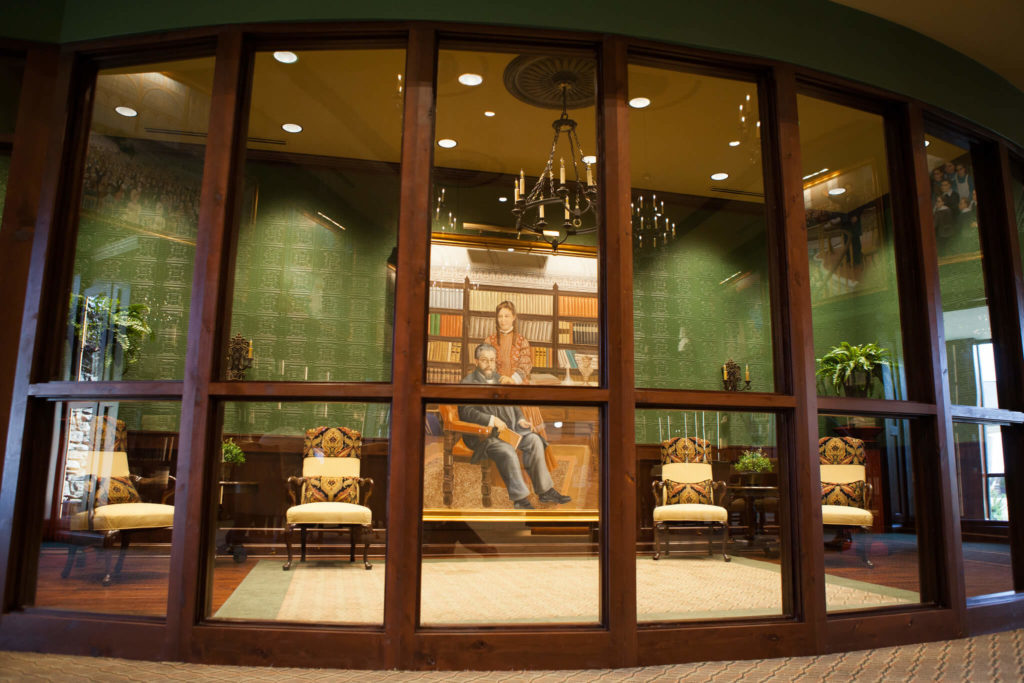
Charles Spurgeon used to tell a tale about an old church buried deep in the ground. He wrote: “at Raleigh, they say, the old church bells still ring at Christmas time, deep, deep, in the earth; and that it was a Christmas morning custom for the people to go out into the valley, and put their ears to the ground to listen to the mysterious chimes of the subterranean temple.” Calling this old tale, “sheer superstition,” Spurgeon nevertheless drew an illustration from it: “preachers…continue to preach in their graves! Being dead, they yet speak; and whether men put their ears to their tombs or not, they cannot but hear them.”[1] If we put our ears to Spurgeon’s tomb this Christmas season, we too might hear the Prince of Preachers preach of our Savior lying in a manger.
Spurgeon loved Christmas. In early years, you could find him on Christmas day in Waterbeach, preaching multiple sermons to “crammed congregations.”[2] In later years, you could find him resting in Mentone, France with his wife Susannah, opening letters and receiving flowers from his congregation. Throughout his life, you could find him diligently raising funds for the orphans at the Stockwell Orphanage so that, though parentless, they too might enjoy Christmastime.[3] Yet, most of all, Spurgeon loved Christmas not for the trees or treats, nor the sleds or snow covered streets. He loved Christmas because of the incarnation of the Lord Jesus Christ.
First, Spurgeon cherished the incarnation because its purpose was to save men from sin and death. He said, “Incarnation prophesies salvation” (MTP 22:713). Since God entered into union with man through the incarnation, its end must be for blessing and not curse. For, “God cannot intend to destroy that race which He thus weds unto Himself.”[4] God had visited men many times before in redemptive history, but the incarnation was “the most wonderful visit of all…when He came to tarry here…to work out our salvation.”[5]
Second, God’s unique glory is displayed in the incarnation through a series of paradoxes. Though Christ upholds the universe, he needed to be carried and nursed in his mother’s arms; though he is the heir of all things, he was “the carpenter’s despised son”; though God is invisible, he was manifest in Christ (NPSP 4:396). The King of kings was not “born in marble halls, swaying the sceptre of universal empire” but instead “his birthplace was a stable,—poor accommodation for the Prince of the kings of the earth.”[6] The Lord chose to dwell in poverty so that through his poverty we may become rich (2 Cor 8:9). Spurgeon wrote, “Kings may, for various reasons, visit their subjects; but they do not think of taking upon themselves their poverty, their sickness, or their sorrow.”[7] Indeed, “It was great poverty to Christ to be a man. Humanity is a poor thing when you set it in comparison with the Deity.”[8]
Lastly, when meditating on the incarnation, it inspires “holy wonder” which leads to grateful worship “with astonishment at the foot of the golden throne.”[9] Immanuel, God with us, is “in all our life’s pilgrimage.”[10] He is with us under all conditions—joy and sorrow. There is no “halting-place, in the march of life, at which Jesus had not paused, or a weary league of the road which He has not traversed.”[11] Jesus’ continual presence is sweet, for “there is no pang that rends the heart, I might almost say not one which disturbs the body, but Jesus Christ has endured it before us.”[12]
This Christmas season, think much on the incarnation and be filled with the holy wonder exuding from Christ’s incarnation. With Bible open and fireplace ablaze, perhaps allow the Prince of Preachers to be your guide to Bethlehem’s gates, that you might bring gifts of joy and worship to the King of kings, lying in a manger.[13]
Merry Christmas, from the Spurgeon Library!
_______________
“There is more of God’s glory and majesty to be seen in the manger and the cross, than in the sparkling stars above, the rolling deep below, the towering mountain, the teeming valleys, the abodes of life, or the abyss of death. Let us then give ourselves up to holy wonder, such as will produce gratitude, worship, love, and confidence, as we think of that great ‘mystery of godliness, God manifest in the flesh.’”
[1] Charles Spurgeon, C. H. Spurgeon’s Autobiography: Compiled from His Diary, Letters, and Records, ed. Susannah Spurgeon, vol. 1 (London: Passmore and Alabaster, 1897) 3–4.
[2] From a letter written to his father, dated Dec. 31, 1851. See CharlesSpurgeon, The Letters of Charles Haddon Spurgeon, ed. Charles Spurgeon Jr (London; Edinburgh; New York: Marshall Brothers Limited), 34.
[3] Spurgeon always had a large heart for the orphans at Stockwell. For example, he cheerfully wrote to them in 1888, “I wish you a merry Christmas. Think of me as I shall think of you when you are eating the plum-pudding. Don’t eat too much, but enjoy yourselves over head and ears.” See ibid., 184.
[4] Charles Spurgeon, “Good Tidings of Great Joy.” Christ’s Incarnation the Foundation of Christianity (London: Passmore and Alabaster, 1901), 83.
[5] Ibid., 86.
[6] Ibid., 118.
[7] Ibid., 86.
[8] Ibid., 117.
[9] Ibid., 37.
[10] Ibid., 57.
[11] Ibid.
[12] Ibid., 58.
[13] For further reading, see Charles Spurgeon, “Good Tidings of Great Joy.” Christ’s Incarnation the Foundation of Christianity (London: Passmore and Alabaster, 1901).